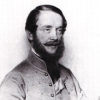Lajos Kossuth

Lajos Kossuth
Lajos Kossuth de Udvard et Kossuthfalvawas a Hungarian lawyer, journalist, politician and Governor-President of the Kingdom of Hungary during the revolution of 1848–49. With the help of his talent in oratory in political debates and public speeches, Kossuth emerged from a poor gentry family into regent-president of Kingdom of Hungary. As the most influential contemporary American journalist Horace Greeley said of Kossuth: “Among the orators, patriots, statesmen, exiles, he has, living or dead, no superior.” Kossuth's powerful English and American...
NationalityHungarian
ProfessionLawyer
Date of Birth19 September 1802
And if you cannot remain indifferent, you must resolve to throw your weight into that balance in which the fate and condition of man is weighed.
Humility is the part of wisdom, and is most becoming in men. But let no one discourage self-reliance; it is, of all the rest, the greatest quality of true manliness.
The time draws near, when a radical change must take place for the whole world in the management of diplomacy.
Even in political considerations, now-a-days, you have stronger motives to feel interested in the fate of Europe than in the fate of the Central or Southern parts of America.
If I had undertaken the practical direction of military operations, and anything went amiss, I feared that my conscience would torture me, as guilty of the fall of my country, as I had not been familiar with military tactics.
The tongue of man is powerful enough to render the ideas which the human intellect conceives; but in the realm of true and deep sentiments it is but a weak interpreter. These are inexpressible, like the endless glory of the Omnipotent.
Fear must rule in a despotism.
Let him who looks for a monument to Washington look around the United States. Your freedom, your independence, your national power, your prosperity, and your prodigious growth are a monument to him.
Light has spread, and even bayonets think.
Nationality is the aggregated individuality of the greatest men of the nation.
My principles in respect of religious interest are two,--one is, that the Church shall not meddle with politics, and the government shall not meddle with religion.
To know a people's character, we must see it at its homes, and look chiefly to the humbler abodes where that portion of the people dwells which makes the broad basis of the national prosperity.
History is the revelation of Providence.
Justice is immortal, eternal, and immutable, like God Himself; and the development of law is only then a progress when it is directed towards those principles which like Him, are eternal; and whenever prejudice or error succeeds in establishing in customary law any doctrine contrary to eternal justice.